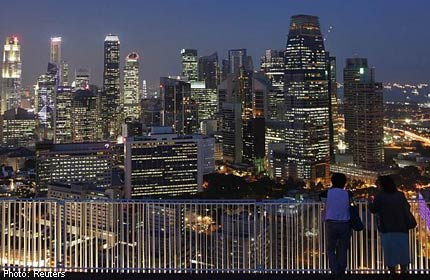
If you are looking to getting rich quickly then being in Singapore is your best bet to do so - provided you have a sound knowledge of personal finance. But if you are hoping that your fortune continues to grow exponentially over your lifetime, then you will have the best chance of doing that in Monaco, UK or the US.
The latest report in the Barclays Wealth Insights series shows the wealthy in Singapore took the least time to build their riches, with more than half of them, or 51 per cent, doing it in less than 10 years.
This was a much higher proportion compared to the global average of 26 per cent and marks Singaporean HNWIs as the group quickest to accumulate their wealth, ahead of respondents in India, China and Hong Kong, where only 30 per cent, 27 per cent and 16 per cent respectively built up their wealth in less than 10 years. Middle Eastern economies Qatar and the UAE, at 48 per cent and 32 per cent respectively, came in second and third behind Singapore as the places to build wealth quickly while developed economies such as the US and Switzerland appear to be among the slowest as less than 10 per cent of the respondents there said they were able to accumulate their wealth within a decade.
Singapore's position as a 'get rich quick' centre was entrenched as the report showed that Singapore also had the highest proportion of respondents, at 14 per cent, accumulating wealth in less than five years. Being wealthy is described as having a net worth of US$1.5 million or more.
To those who are looking to emulate the success of this exclusive club, it however appears that a sound sense of personal investment and finance is more important than having good business acumen or being part of a wealthy family.
For Singapore's rich, the principal sources of overall wealth are personal investments at 72 per cent, profits from property at 58 per cent, and savings through earnings/bonus over time at 55 per cent. Accumulating wealth through their business sale and/or profit and inheritance accounted for only 50 per cent and 32 per cent respectively.
Personal investments ranked among the top three sources of income for most markets. This factor, however, played a greater role in wealth accumulation in Singapore than most other places, as only in China and Hong Kong was it even more significant at 99 per cent and 82 per cent respectively. Profits from investment in property in these three markets also yielded the greatest sources of wealth generation. Singapore trailed behind China and Hong Kong, at 84 per cent and 80 per cent respectively, in this regard.
Even though Singapore and other Asian countries present good chances to build your wealth quickly, if you are looking to multiply that significantly over your lifetime then you will have a better chance of doing it elsewhere. The report showed that only a quarter of Singapore's rich have seen dramatic increases of five-fold or more in their wealth. Hong Kong's HNWIs did marginally better at 30 per cent and China and India fared worse at only 17 per cent and 15 per cent respectively.

Based on a global survey of more than 2,000 HNWIs, the report - Origins and Legacy: The Changing Order of Wealth Creation - provides an in-depth study into how wealth is now being made, spent and shared across the world. Globally, wealth is created more quickly today than in the past with the technological revolution playing an important role. According to Srinivas Siripurapu at the wealth and investment management division at Barclays, when the UK's Sunday Times Rich List was first published in 1989, only 43 of the country's richest 200 people, or 21 per cent, had made their fortunes themselves.
"Wealth is now more international, more diverse and more driven by entrepreneurship rather than inheritance. On the 2013 Sunday Times Rich List, almost 80 per cent are self-made and a high proportion were born overseas. The absolute figures of wealth are also much higher - compared with 1989, the UK is home to ten times as many billionaires," said Mr Siripurapu.
He added that on the Forbes' World Billionaires List, technology is now the second-most common way US billionaires generated their wealth, with 51 out of 425 becoming rich through this industry.
It also seems that when the going gets tough, the rich get richer. In Singapore, as many as 47 per cent of the respondents indicated that they had increased their wealth during the economic downturn in 2009. However, resource-rich countries like Qatar, the UAE and India did even better during the downturn with more than half of their wealthy increasing their net worth during this period.
But all is not that rosy for the rich in Singapore as they face the greatest risk, compared to their counterparts elsewhere, in facing unexpected dips in their fortunes. The report showed that at 69 per cent, Singapore comprises the highest proportion of HNWIs experiencing large fluctuations in wealth. Mr Siripurapu said this could be due to fluctuations in the property market over the last decade.

